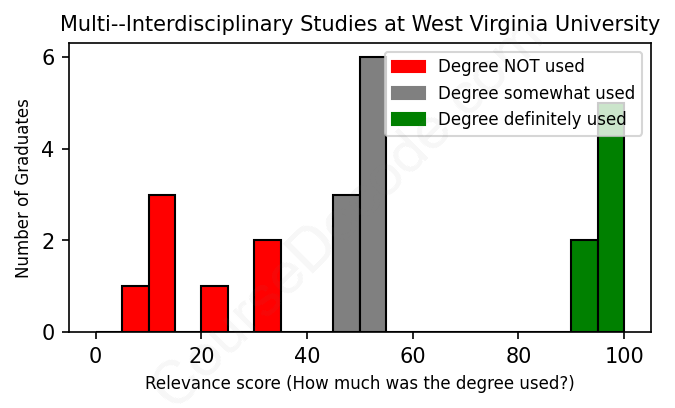
First, some facts. Of the Multi--Interdisciplinary Studies graduates from West Virginia University we've analyzed , here's how many have used (or NOT used) their degree in their career:

These are estimates based on AI analysis of 23 LinkedIn profiles (see below).
The verdict? Significantly below average. Overall, with an average relevance score of 54%, Multi--Interdisciplinary Studies graduates from West Virginia University have a much lower likelihood (-13%) of finding work in this field compared to the average graduate across all fields:
And for comparison, here's the chart for all profiles we've looked at across all degrees.
Also, after graduating, 56% of these graduates have pursued further education other than another Bachelor's degree (such as a Masters degree or other), compared to the average across all profiles of 35%. This suggests you may need more than just a Bachelors degree to be competitive as a Multi--Interdisciplinary Studies graduate.
See the details:
|
Relevance score: 31% We think this person has NOT gone into a career related to their degree. We think this person has NOT gone into a career related to their degree.
DEGREE INFOGraduated in 2015 from West Virginia University with a Bachelors Degree in Multi--Interdisciplinary Studies. Also pursued further education since (see below). JOB HISTORY SINCE GRADUATIONEnglish Second Language Teacher Major English Center Jul 2015 - Jan 2017 Student Mentor  Global Leadership Adventures Jun 2017 - Aug 2018 Long Term Substitute Teacher  STRIVE Prep Sep 2018 - May 2019 Community Advisor  Borderless Friends Forever Mar 2018 - Jun 2020 Health Coach  PHD Weight Loss Sep 2020 - Apr 2021 Executive Assistant to the City Manager  City of Durango Jun 2021 - Sep 2022 Assistant to the Vice President of Diversity Affairs + the Dean of Enrollment Management  Fort Lewis College Oct 2022 - Present FURTHER DEGREES DONE SINCE GRADUATINGMaster's degreeSaybrook University 2020 - 2022 ABOUTI bring a unique blend of administrative expertise and a passion for education having previously taught around the world. I am dedicated to to supporting educational leaders in their mission to create an inclusive, equitable and impactful institution where our students are at the center. My commitment to social justice and equity is at the core of my work, and I thrive in roles that allow me to make a meaningful difference. I am experienced in managing complex calendars, coordinating large events, and facilitating seamless communication to ensure smooth operations. In addition to my administrative skills, my academic background has equipped me with a deep understanding of the principles of peace and Justice through relationship building. I am driven to apply these principles to my work. I strive to cultivate an inclusive higher education community serving as the Chair of Staff Council to advocate for the well being of the staff. Creating a joyful and contented staff environment directly translates to improved support for our students. Lets connect and explore opportunities to collaborate on projects that align with our shared commitment to social change and excellence in higher education. |
The top 10 most common jobs done by the graduates we've analyzed (ranked most common to least) are:
After analyzing the LinkedIn job profiles of graduates from West Virginia University's Multi-Interdisciplinary Studies program, it’s clear that there's a broad range of careers people have ventured into. Common roles include event management positions, teaching roles, and operational management in various sectors. Many graduates have taken on jobs like Operations Manager, Teacher, or even Director of Ministries, highlighting a tendency toward positions that require strong communication, organizational, and analytical skills. However, these roles often do not necessitate direct application of the specialized knowledge one would gain from a Multi-Interdisciplinary Studies degree.
On the relevance front, it’s a mixed bag. Some graduates have indeed landed jobs that are closely aligned with their degree, such as teaching and roles in community engagement, while many others have taken jobs that only tangentially relate to the skills developed in their program. For the most part, while the degree provides a valuable skill set, the direct relevance of Multi-Interdisciplinary Studies to the jobs held by alumni isn’t always apparent. Many positions seem to leverage broader interpersonal and managerial skills rather than the interdisciplinary framework that the degree advocates, resulting in a disconnect between the expected and actual employment relevance.
Here is a visual representation of the most common words in job titles for Multi--Interdisciplinary Studies graduates (this is across all Multi--Interdisciplinary Studies graduates we've analyzed, not just those who went to West Virginia University):

Graduates with a degree in Multi-Interdisciplinary Studies from West Virginia University seem to take diverse paths after finishing school. Their first jobs often reflect this variety, ranging from teaching positions in elementary schools to roles in sales, operations management, and even professional sports. Many initially enter roles that leverage their soft skills, such as teaching or customer relations, which can lead to more specialized positions in education or management after a few years. It’s interesting to see that some even step into completely different fields, like a soccer player transitioning into construction inspection or someone starting as a personal banker and gradually climbing into metal trading. This shows a willingness to explore various opportunities and adapt based on experiences and interests.
Looking five to ten years out, it becomes evident that while some have carved out meaningful careers relevant to their studies, others have shifted considerably away from that original path. For instance, teachers seem to stay within the education field, often moving into more advanced roles or different educational settings. Meanwhile, individuals initially in sales or business have often advanced to managerial or specialized positions, showing that the soft skills and insights gained from their interdisciplinary education can be very transferable. However, there are examples of more fragmented career trajectories, like some who started in industries quite disconnected from their field of study and ended up in various unrelated roles, such as warehouse positions or entry-level analyst jobs. Overall, the alumni's experiences reflect a mixed bag of success in building careers directly related to their studies and others who have taken a more winding road in their professional lives.
Honestly, a Bachelor’s degree in Multi-Interdisciplinary Studies can be a mixed bag when it comes to difficulty. Because it allows you to combine courses from different fields, you might find some classes really engaging and easier to handle since you're studying what interests you. But that does mean you’ll also have to keep up with various subjects, which could get tricky if you’re not well-organized or if you hit a subject you’re not as keen on. Overall, it’s generally considered a bit more flexible and potentially less intense than traditional degrees, but that doesn’t mean it’s a walk in the park. It really depends on how much effort you’re willing to put in and how you balance those different disciplines!
Most commonly, in the LinkedIn profiles we've looked at, it takes people 4 years to finish a Bachelor degree in Multi--Interdisciplinary Studies.
Alright, so looking at these Multi-Interdisciplinary Studies grads from West Virginia University, it seems like they have a pretty mixed bag in terms of income potential. Some have definitely landed roles that suggest they're making decent money, like the former player for the Washington Redskins who then moved through a series of managerial positions. Others, like teachers and those in entry-level positions in retail or non-profits, might not be pulling in as much cash. The ones in more technical roles or leadership positions, especially in areas like finance or event management, likely have a better salary. Overall, it looks like if they stuck with fields that are more in-demand or opened their own businesses, they could be doing relatively well, but not everyone seems to be hitting it big right away.
Here is a visual representation of the most common words seen in the "about" section of LinkedIn profiles who have a Bachelor degree in Multi--Interdisciplinary Studies (this is across all Multi--Interdisciplinary Studies graduates we've analyzed, not just those who went to West Virginia University). This may or may not be useful:

Here are all colleges offering a Bachelor degree in Multi--Interdisciplinary Studies (ordered by the average relevance score of their Multi--Interdisciplinary Studies graduates, best to worst) where we have analyzed at least 10 of their graduates:
| College | Score | Count |
|---|---|---|
 Texas State University Texas State University
|
87 | 10 |
 Stephen F. Austin State University Stephen F. Austin State University
|
78 | 11 |
 University of North Texas University of North Texas
|
74 | 13 |
 Texas A&M University Texas A&M University
|
69 | 16 |
 The University of Texas at Arlington The University of Texas at Arlington
|
69 | 11 |
 University of Houston-Downtown University of Houston-Downtown
|
65 | 20 |
 University of Central Florida University of Central Florida
|
64 | 35 |
 The University of Texas at San Antonio The University of Texas at San Antonio
|
62 | 29 |
 Liberty University Liberty University
|
61 | 49 |
 The University of Texas at El Paso The University of Texas at El Paso
|
61 | 15 |
 San Diego State University San Diego State University
|
55 | 13 |
 West Virginia University West Virginia University
|
54 | 23 |
 Grantham University Grantham University
|
54 | 10 |
 Western Kentucky University Western Kentucky University
|
47 | 14 |
 Arizona State University Arizona State University
|
44 | 26 |
 Florida International University Florida International University
|
40 | 11 |